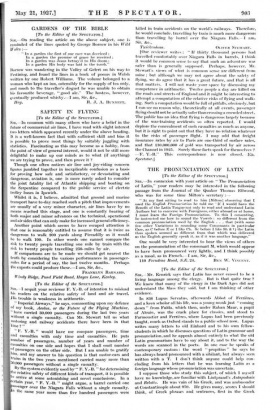[To the Editor of the SPECTATOR.]
acquit your reviewer F. Y.-B. of intention to mislead his readers on the relative safety of land and air travel. Ills trouble is we,akness in arithmetic.
" Imperial Airways," he says, commenting upon my defence of my book, Aeolus, or the Future of the Flying Machine,
have carried 30,000 passengers during the last two years Without a single casualty. Can Mr. Stewart tell us what motoring and railway accidents there have been in that time ?
"F. Y.-B." would have me compare passengers, time and casualties with only time and casualties. He puts number of passengers, number of years and number of Casualties on one side and hopes that I shall omit number of passengers on the other side. But I am unable to gratify him, and my answer to his question is that motor-cars and trains in the two years mentioned carried many more than 40,000 passengers without a single casualty. By the system evidently used by" F. Y.-B. "for determining le relative safety of different kinds of transport, it is possible 0 arrive at some astonishing and novel conclusions. In a ertain year, "F. Y.-B." might argue, a barrel carried one assenger over the Niagara Falls without a single casualty. n the same year more than five hundred passengers were
killed in train accidents on the world's railways. Therefore, he would conclude, travelling by train is much more dangerous than travelling by barrel over the Niagara Falls.—! am. Sir, &e.,
[Our reviewer writes : " If thirty thousand persons had travelled comfortably over Niagara Falls in barrels, I think it would be common sense to say that such an adventure was safer than is generally supposed. Perhaps, however, Mr. Stewart's views of what is common sense arc different from mine ; but although we may not agree about the safety of flying, we do agree that it has a great future, and that is all that matters. I will not waste your space by discussing my competence in arithmetic. Twelve people a (lay are killed on the roads and streets of England and it might be interesting to attempt a computation of the relative risks of flying and walk- ing. Such a computation would be full of pitfalls, obviously, but I can see no reason why, theoretically at all events, passenger flying should not be actually safer than crossing a crowded street. The public has an idea that flying is dangerous largely because of the war-training accidents so often reported. I would deplore the concealment of such casualties as much as anyone, but it is right to point out that they have no relation whatever to the risks of passenger flight. I may add that freight insurance rates by air to Paris are one-third of surface rates, and that 210,000,000 of gold was transported by air across the Channel in 1925. Surely these facts speak for themselves ? —F. Y.-B." This correspondence is now closed.—En, Spectator.]










































 Previous page
Previous page